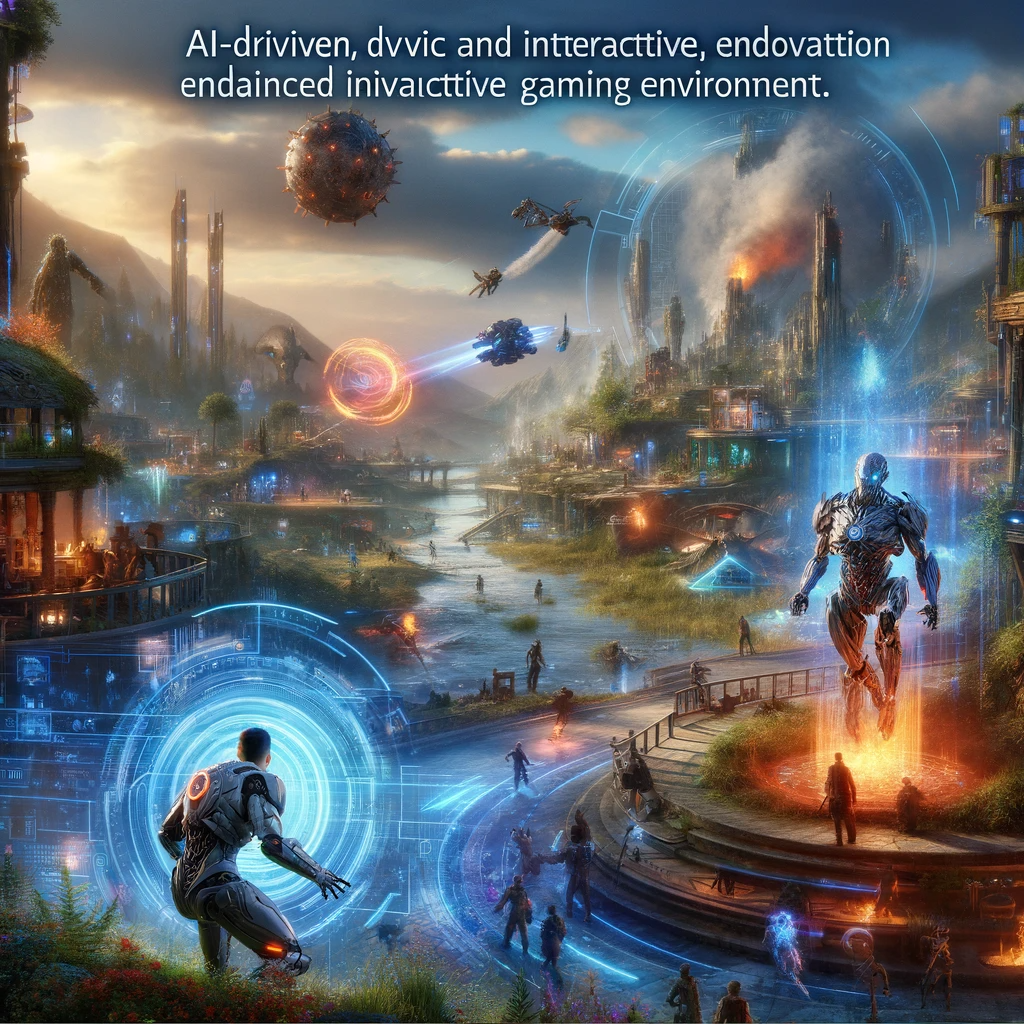Video games have come a long way since their inception, evolving into complex and immersive experiences that captivate millions of players worldwide. One of the driving forces behind this evolution is artificial intelligence (AI). In this article, we’ll explore the significant role AI plays in the gaming industry, from shaping game design and development to creating dynamic and responsive gaming environments.
The Marriage of AI and Gaming
The integration of AI into video games has unlocked a world of possibilities, transforming the gaming landscape in numerous ways. Here’s a closer look at how AI is influencing video game design and development:
Procedural Content Generation
Procedural content generation is a technique that uses algorithms to create game content dynamically. This approach allows developers to generate vast and diverse game worlds efficiently. AI algorithms can design landscapes, populate them with objects, and even craft unique quests or missions.
Games like “No Man’s Sky” and “Minecraft” utilize procedural generation to create expansive, open-ended worlds where players can explore, build, and interact with a virtually infinite array of possibilities.
Improved Non-Player Characters (NPCs)
AI has revolutionized the behavior and intelligence of non-player characters (NPCs) in video games. Gone are the days of predictable and scripted NPC interactions. Modern games employ advanced AI to make NPCs more responsive, adaptive, and human-like in their actions.
Games like “Red Dead Redemption 2” feature NPCs with intricate routines, emotions, and realistic reactions to the player’s choices. AI-driven NPCs can engage in dynamic conversations, react to the game’s world, and remember past interactions with the player.
Enhanced Game Testing and Quality Assurance
AI is not limited to game development; it also plays a crucial role in quality assurance and testing. AI-driven testing tools can analyze various aspects of a game, from gameplay mechanics to graphics and audio, identifying bugs and issues more efficiently than human testers.
AI-powered testing ensures that games are more stable and free from glitches, providing a smoother and more enjoyable experience for players.
Adaptive Difficulty Levels
AI algorithms can dynamically adjust the difficulty level of a game based on a player’s skill and performance. This feature, known as adaptive difficulty scaling, ensures that players of all skill levels can enjoy a game without becoming frustrated or bored.
Games like “Left 4 Dead” and “Resident Evil” use AI to modify enemy behavior, spawn rates, and challenges in response to the player’s performance, creating a personalized gaming experience.

AI-Generated Music and Soundscapes
AI is not limited to visuals; it also influences the auditory aspects of gaming. AI-powered music and sound generation systems can compose dynamic soundtracks and ambient soundscapes that adapt to the player’s actions and the game’s narrative.
Games like “Deus Ex: Human Revolution” utilize AI to generate music that matches the player’s choices and the tension of the gameplay, enhancing immersion and emotional engagement.
Predictive Analytics for Player Behavior
AI-driven analytics tools are increasingly used to understand player behavior and preferences. By analyzing player data, game developers can gain insights into how gamers interact with their titles. This information informs decisions about game updates, expansions, and future projects.
AI-powered analytics help developers tailor content and features to align with player expectations, resulting in more engaging and successful games.
Streamlining Game Development
AI also aids in streamlining the game development process. Automated tools can assist in tasks such as level design, bug fixing, and asset creation. This not only speeds up development but also reduces costs, allowing smaller studios to create ambitious and innovative games.
Dynamic Storytelling and Narrative Generation
AI is enabling dynamic storytelling in video games, where narratives can adapt and change based on player choices. Games like “The Witcher 3” and “Detroit: Become Human” feature branching narratives where player decisions impact the story’s outcome.
AI-driven narrative generation ensures that players have a unique and personalized experience with each playthrough, enhancing replayability.
Realistic Physics and Simulation
AI-driven physics engines and simulations enhance the realism and immersion of games. These engines simulate the behavior of objects, characters, and environments, allowing for lifelike interactions and physics-based gameplay.
Games like “Grand Theft Auto V” and “Kerbal Space Program” use AI-powered physics engines to create realistic vehicle handling, destructible environments, and complex simulations of real-world phenomena.
AI in Game Personalization and Recommendations
AI is also employed in recommending games to players based on their preferences. Platforms like Steam and Xbox use AI algorithms to analyze player behavior and suggest games that align with their interests.
Moreover, AI can personalize in-game experiences, from adjusting the in-game world’s visuals to recommending in-game purchases tailored to individual players.
AI has undeniably left an indelible mark on the world of video games, influencing everything from game design and development to player experiences. As technology continues to advance, we can expect AI to play an even more significant role in shaping the future of gaming, ushering in new possibilities and immersive experiences.
